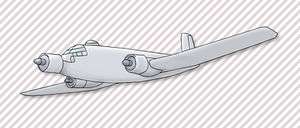Junkers Ju 352
| Ju 352 | |
|---|---|
 | |
| Role | Transport |
| National origin | Nazi Germany |
| Manufacturer | Junkers |
| Designer | Konrad Eicholtz |
| First flight | 18 August 1943 |
| Primary user | Luftwaffe |
| Number built | 50 [1] |
| Developed from | Junkers Ju 252 |
The Junkers Ju 352 Herkules ("Hercules" in German) was a German World War II transport aircraft that was developed from the Junkers Ju 252.[2]
Design and development
During the late spring of 1942, the Junkers-Dessau project office was instructed by the Reich Air Ministry (RLM) to investigate the possibility of redesigning the structure of the Junkers Ju 252 transport to make maximum use of non-strategic materials,[3] replacing the Junkers Jumo 211F engines of the Ju 252 with Bramo 323R radial engines.[3] The result followed closely the aerodynamic design of the Ju 252 but was an entirely new aircraft. The wing of the Ju 352 was similar in outline to that of the Ju 252 but, mounted further aft on the fuselage, was entirely of wooden construction. The Ju 352 also had a similar Trapoklappe ("Transportklappe", rear loading ramp) to that of the Ju 252. The ramp allowed the loading of vehicles or freight into the cargo hold while holding the fuselage level.[2]
In general, the Ju 352 was considered a major improvement over the original Junkers Ju 52 but noticeably inferior to the Junkers Ju 252.[4] Deliveries of the Ju 352 had only just begun to get into their stride when, during the summer of 1944, the worsening war situation resulted in the decision to abandon further production of transport aircraft. In September the last two Ju 352As rolled off the assembly line, 10 pre-production Ju 352s and 33 production Ju 352s having been manufactured.[4] Several developments of the basic design were proposed before production was halted, these including the Ju 352B with more powerful engines and increased defensive armament.
Operators
- Czechoslovakian Air Force (Postwar)
- One Letov-built aircraft was presented to the Soviet Union in 1946.
Specifications (Ju 352A)
Data from [3]
General characteristics
- Crew: 3–4
- Length: 24.60 m (80 ft 8½ in)
- Wingspan: 34.20 m (112 ft 2¾ in)
- Height: 5.74 m (18 ft 10¼ in)
- Wing area: 128.20 m² (1,379.90 ft²)
- Empty weight: 12,500 kg (27,561 lb)
- Max. takeoff weight: 19,600 kg (43,216 lb)
- Powerplant: 3 × BMW Bramo 323 R-2 Fafnir 9-cylinder radial engine, 735.5 kW, (986 hp,)1,000 PS 883 kW (1,200 PS, 1,184 hp) with MW-50 each
Performance
- Maximum speed: 370 km/h (230 mph) at 5,050 m (16,565 ft)
- Cruise speed: 241 km/h (150 mph)
- Range: 1,800 km (1,120 miles)
- Service ceiling: 6,000 m (19,685 ft)
Armament
- Guns:
- 1 x MG 151 cannon in dorsal turret
- 2 x MG 131 machine guns in side windows
See also
Related development
Aircraft of comparable role, configuration and era
Related lists
References
| Wikimedia Commons has media related to Junkers. |
- ↑ 43 by Junkers at Fritzlar and seven in Czechoslovakia by Letov
- 1 2 Kay, Antony L. & J.R. Smith. German Aircraft of the Second World War. London: Putnam, 2002. 220.
- 1 2 3 Kay, Antonty L. & Paul Couper. Junkers Aircraft and Engines, 1913–1945. London: Putnam, 2004. 229.
- 1 2 LePage, Jean-Denis G.G. Aircraft of the Luftwaffe 1935–1945: An Illustrated History. Jefferson, NC: McFarland & Co., 2009. 341.